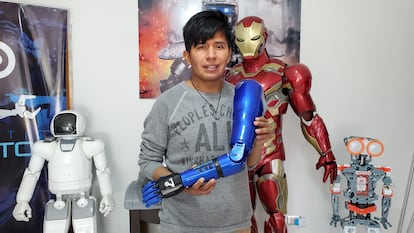The robotics whiz who is giving limbs back to the disabled
Using 3D printers, Bolivian electronics engineer Roly Mamani manufactures accessible prosthetics that benefit people who cannot afford expensive equipment


Don Felipe plows the land manually. He uses a shovel to dig and covers the furrows with another tool. He plants corn on his land in the community of Tocopa, near Lake Titicaca, more than 100 kilometers from the city of El Alto. He works hard under the Altiplano sun. It would be a typical story of a farmer in rural Bolivia, were it not for the fact that Don Felipe lost both hands and part of his forearms 45 years ago in a dynamite accident.
Last year, Don Felipe’s story came to the attention of Roly Mamani, 32, who went to visit him with a view to giving him his hands back. He carried some sample prostheses in his backpack to calculate the dimensions and promised to create a custom-made pair of hands for him. Several weeks later, Mamani gave the 70-year-old back his limbs – limbs he had lost in his 30s. Don Felipe could be seen grinning from ear to ear as he tested his brand-new prostheses by lifting a glass of Coca-Cola.
An electronics wizard, Mamani says that, as far as he’s concerned, technology is the closest thing he knows to magic. As a “maker,” he realized there was a lack of solutions for people with motor disabilities, especially those without financial resources, in his country. Now, for the past four years, with his Robotics Creators venture, he has been addressing this lack in health technology with the creation of integral bionic systems and prosthetic limbs for people in Bolivia and beyond.
An electronics engineer, Mamani first took an interest in robotics when he was six and “in love with LEDs and curious about how a light turns on.” His interest was also driven by his desire to have more toys. This interest led him to establish his company together with his brother Juan Carlos, a physiotherapist, with the aim of helping people who have lost a limb or lost mobility in an existing one. He began creating animatronics, moving on to combat, educational and competitive robots, but he was aware that this did not go as far as he would like.
“I realized that if we didn’t bring this knowledge to a point that could really make a difference, it didn’t make much sense,” says Mamani, who welcomed EL PAÍS to his workshop in Achocalla, a small community 15 kilometers away from the bustle of the Bolivian capital. “When I was in college, I often wondered why there were no solutions in our country in this field. Based on the experience and knowledge we gained, my brother and I have dared to provide a solution for a person with a transradial amputation using 3D printing.”

The Robotics Creators workshop is located in an area surrounded by eucalyptus trees, a lagoon and gentle, rolling hills. People come to this secluded space from different areas of La Paz, but also from very remote rural areas and even from abroad. Mamani estimates that, in the four years since they set up, they have been able to help more than 200 families. Among his patients are children, young people, adults, senior citizens and even pets – a field he calls furry bionics. “The greatest reward is to see a person smile again, to see a mother cry seeing her child given a new opportunity,” he says. “These are things that money can never buy; they are experiences that fill your life with good energy.”
Speaking at Robotics Creators, a space full of animatronic figures such as an Iron Man armor to scale, dinosaurs and rescued robot toys, Mamani says that to get to this point in his venture he also went through difficulties, ranging from not having large-scale 3D printers to not owning an industrial scanner. Other challenges were not having experience in anatomical design and also having to learn how to interact with disabled people. “First, they have to heal psychologically so that later they can help us to bring about a positive result,” Mamani says. “Everything takes time. Earlier, we were dealing with simpler problems, but subsequently we have had people with disarticulations of their entire shoulder, and these are more complex situations that require more experience.”
According to 2019 data from the Unified National Registry System of Persons with Disabilities, there are 95,884 disabled people in Bolivia, 38% of whom have physical-motor disabilities. According to the 2021 report entitled Inclusion of Persons with Disabilities in Latin America and the Caribbean: A Path to Sustainable Development, the rate in rural areas is twice that of urban areas – 15.9% against 8.7%. This disproportionate number of disabled people in the countryside is a global phenomenon and is possibly due to less accessible preventive healthcare and treatment, and higher rates of poverty.
Mamani is aware that working with technology requires money, and most of those who come to Robotics Creators are people of limited means. “A person who loses a limb is someone who is usually exposed to dangerous work because they have no choice,” he says. “Sometimes they want to earn a little more and can’t get a safe job. Often an accident happens, and life takes a turn for the worse.”
On account of this, the solutions manufactured in Achocalla do not cost more than a high-end cell phone. In many cases, the patient is asked to pay just 50% of expenses; they assume the cost of materials, while the labor is assumed by Mamani and his team.
“A conventional prosthesis can start at $5,000, a mechanical prosthesis $10,000 and, then, it’s $16,000 and upwards for a bionic prosthesis,” says Mamani. “That is really a lot of money for the people we work with. We have worked out how to make prostheses in the most affordable and efficient way possible. There are people who come from rural areas to the workshop asking for help without being able to speak Spanish. In those cases, we see if we have the materials and we make the donation directly without charging them a penny.”
Mamani’s company makes up some of the shortfall with the work they do in other areas such as the rental and creation of animatronics, and educational and combat robots, as well as design and 3D printing services. However, importing components to improve their projects can be complicated due to the economic factor and the lack of government support.
Despite these limitations, the 3D printers at Robotics Creators work tirelessly to create biomechanical prostheses that only require elbow movement to be activated; they also create the robotic type, with internal integrated circuits and a battery, which makes use of a sensor that works on motor skills for those who have no elbow movement. “The raw material is made from plastic and its derivatives, which are also biodegradable,” says Mamani. “So, we are taking care of the planet when the prostheses are discarded.”
But Mamani’s real dream has not yet come to fruition. In the future, he and his team want to build a bionic rehabilitation center with the capacity to develop robotic exoskeletons for people with paralysis: “I believe that beyond simply studying and having a career, we also need to make a contribution to life,” says Mamani. “There are those who believe that making robots is not a real job when, in fact, there are miracles that can be done with technology.”
Tu suscripción se está usando en otro dispositivo
¿Quieres añadir otro usuario a tu suscripción?
Si continúas leyendo en este dispositivo, no se podrá leer en el otro.
FlechaTu suscripción se está usando en otro dispositivo y solo puedes acceder a EL PAÍS desde un dispositivo a la vez.
Si quieres compartir tu cuenta, cambia tu suscripción a la modalidad Premium, así podrás añadir otro usuario. Cada uno accederá con su propia cuenta de email, lo que os permitirá personalizar vuestra experiencia en EL PAÍS.
¿Tienes una suscripción de empresa? Accede aquí para contratar más cuentas.
En el caso de no saber quién está usando tu cuenta, te recomendamos cambiar tu contraseña aquí.
Si decides continuar compartiendo tu cuenta, este mensaje se mostrará en tu dispositivo y en el de la otra persona que está usando tu cuenta de forma indefinida, afectando a tu experiencia de lectura. Puedes consultar aquí los términos y condiciones de la suscripción digital.








































